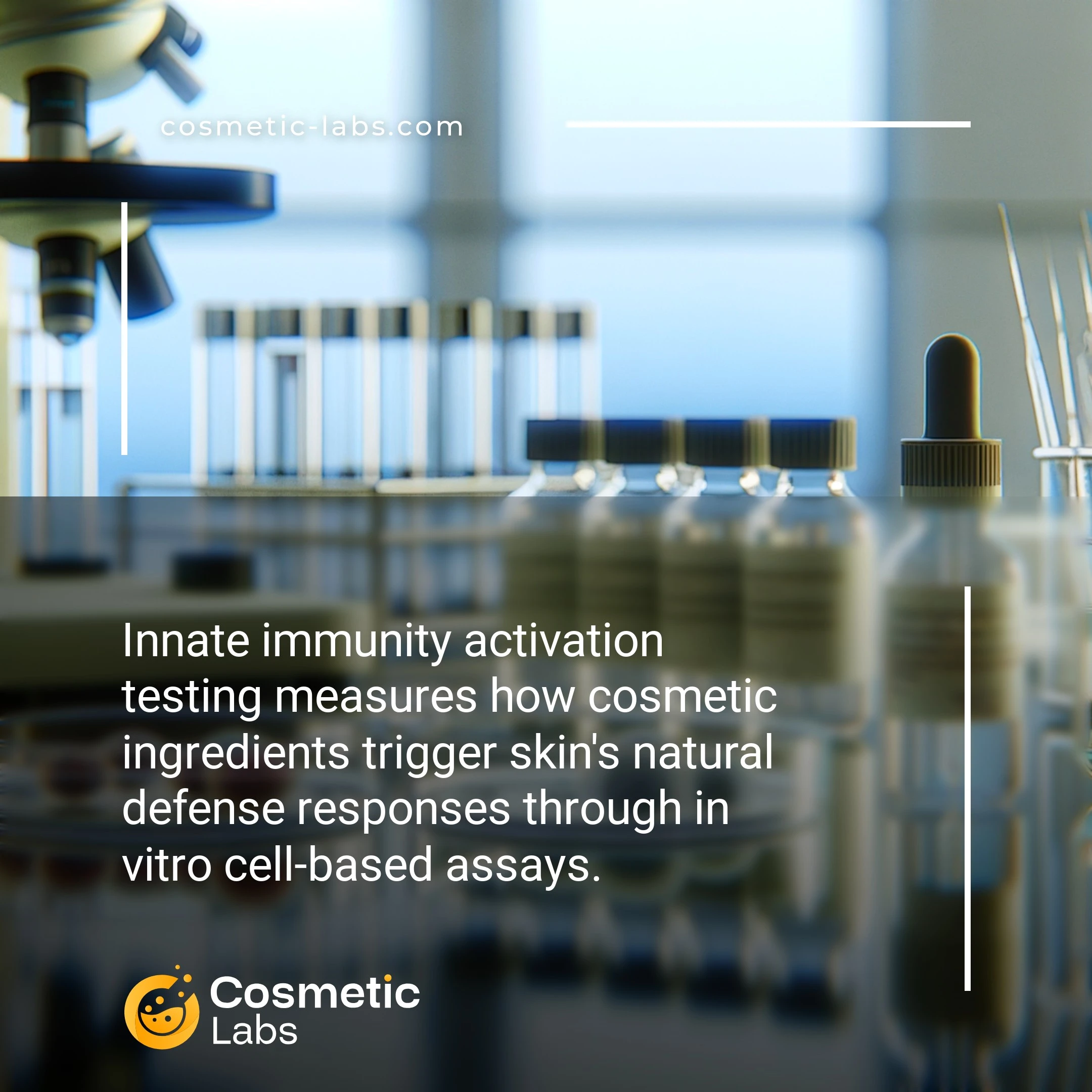Innate Immunity Testing Services for Cosmetic Brands

What is Innate immunity activation testing?
Innate immunity activation testing services measure how cosmetic ingredients and formulations stimulate the skin’s natural defense mechanisms through laboratory assays that track immune cell responses. These tests use keratinocyte cultures and inflammatory marker analysis to evaluate whether your active ingredients can boost skin barrier function and antimicrobial peptide production. Labs typically run cytokine profiling and toll-like receptor activation studies to demonstrate your product’s ability to strengthen the skin’s first line of defense against environmental stressors and pathogens.
Why do you need this service?
Beauty brands use innate immunity activation testing to validate anti-inflammatory claims for sensitive skin products and demonstrate protective barrier enhancement in serums and moisturizers. Labs measure cytokine responses and immune cell activation patterns to provide quantifiable data for regulatory submissions and marketing claims, helping you differentiate products in competitive markets like anti-aging and barrier repair categories.
Who provides Innate immunity activation testing services?
All cosmetic labs providing Innate immunity activation testing services
There is no company providing these services at the moment.
Innate Immune Response Testing Services
Cosmetic labs evaluate how beauty products interact with the skin’s first line of defense through targeted immune response assessments. These tests measure cellular activation patterns and inflammatory markers to validate product safety and efficacy claims related to skin barrier protection.
Cell-Based Immune Activation Assays
Labs use specialized cell cultures to test how ingredients trigger innate immune responses in skin tissue. Keratinocytes and dendritic cells serve as primary models for measuring cytokine release and cellular stress markers.
Testing protocols include:
- Toll-like receptor activation screening
- Inflammatory cytokine profiling (IL-1β, TNF-α, IL-6)
- Antioxidant response element analysis
- Cell viability and proliferation monitoring
Results help brands understand potential irritation risks and optimize formulations for sensitive skin applications.
Biomarker Analysis and Safety Profiling
Advanced testing measures specific immune signaling pathways to determine product compatibility with natural skin defense mechanisms. Labs analyze protein expression changes and enzymatic activity following ingredient exposure.
Key measurements include:
- Complement system activation levels
- Pattern recognition receptor responses
- Antimicrobial peptide production
- Barrier function integrity markers
This data supports regulatory submissions and helps brands develop targeted marketing claims about skin barrier support and gentle formulation profiles. Contact labs on our platform to discuss specific testing requirements for your product development needs.
Practical Applications of Innate Immunity Activation Testing
Beauty brands rely on innate immunity activation testing applications to validate their formulations’ ability to strengthen skin’s natural defense mechanisms and support barrier function recovery.
Anti-Aging Product Development
Labs measure cytokine production levels and inflammatory marker responses to demonstrate how active ingredients boost cellular repair processes. Testing protocols evaluate keratinocyte activation, fibroblast stimulation, and antioxidant enzyme upregulation within 24-72 hour timeframes.
Brands use these results to support claims about accelerated skin recovery and enhanced protection against environmental stressors. The data helps formulation teams optimize concentrations of peptides, botanical extracts, and vitamin complexes for maximum immune-supporting activity.
| Test Parameter | Measurement Method | Typical Results Timeline |
|---|---|---|
| Cytokine Release | ELISA Assay | 6-48 hours |
| Cell Viability | MTT Analysis | 24-72 hours |
| Antioxidant Activity | DPPH Scavenging | 2-4 hours |
| Barrier Function | TEER Measurement | 12-96 hours |
Sensitive Skin Formulation Validation
Testing services evaluate how ingredients modulate immune responses in compromised skin models. Labs assess toll-like receptor activation, complement cascade reactions, and mast cell degranulation patterns to identify gentle yet effective formulations.
This approach helps brands develop products for reactive skin types while avoiding ingredients that trigger excessive inflammatory responses. Results guide the selection of soothing agents, prebiotics, and barrier-repair compounds that work synergistically with the skin’s natural immunity.
Ready to validate your formulation’s immune-supporting properties? Contact specialized labs on our platform to discuss your specific testing requirements and timeline.
